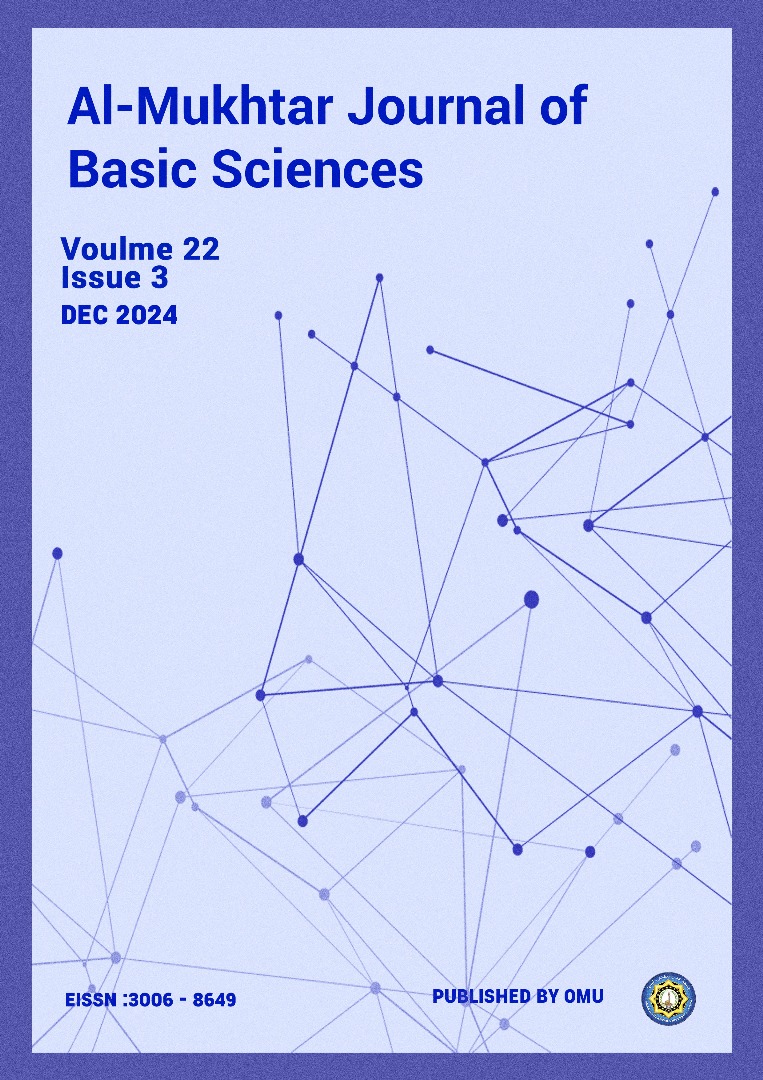The Effect of Algal Biochar in Improving Wheat Triticum aestivum L Performance under Salinity Stress
DOI:
https://doi.org/10.54172/1c2b0m94Keywords:
Wheat Triticum Aestivum L, Salinity Stress, Algal Biochar, Growth, YieldAbstract
Salinity is one of the major abiotic factors in global food security. However, algal biochar (ABC) could be particularly well suited to improve plant growth under salinity stress conditions. Therefore, the present study was conducted to evaluate the effect of Algal Biochar (ABC) on the growth and yield of wheat Triticum aestivum L grown under salinity stress. Pots experiment with and without combinations of algal biochar (ABC) under saline and non-saline conditions (0 and 120mM NaCl) was performed. Wheat grains were sowed in plastic pots filled with four kilograms of sandy soil and mixed with 3% of algal biochar. The experiment was designed in a completely randomized design (CRD) with four replications. The study found that 3% of ABC mitigated the negative effects of salinity stress and improved wheat performance. The result indicated that the application of ABC significantly (P< 0.05) increased plant height by 10%, tiller number plant-1 by 40%, spike number plant-1 by 42%, spikelet number spike-1 by 11%, grain number plant-1 by 25%, plant dry weight by 8%, 1000 grain weight by 35%, harvest index by 56%, and grain yield plant-1 by 69%. The study suggests that the application of ABC could be an effective strategy to improve the growth and yield of wheat crops under salinity stress conditions.
References
Abd el Aal, A. A., Shehata, H. S., & Elgaml, N. M. (2020). Maximizing Utilization of Bio-Fertilizers Immobilized on Bio-Char to Improve Bio-Characterization of Stevia Plant (Honey Leaves). Middle East J, 9(4), 1066-1078.
Abideen, Z., Waqif, H., Munir, N., El-Keblawy, A., Hasnain, M., Radicetti, E., ... & Haider, G. (2022). Algal-mediated nanoparticles, phycochar, and biofertilizers for mitigating abiotic stresses in plants: A review. Agronomy, 12(8), 1788.
Akhtar, S. S., Andersen, M. N., & Liu, F. (2015). Biochar mitigates salinity stress in potato. Journal of agronomy and crop science, 201(5), 368-378.
Ali, A. Y. A., Ibrahim, M. E. H., Zhou, G., Zhu, G., Elsiddig, A. M. I., Suliman, M. S. E., ... & Sa-lah, E. G. I. (2022). Interactive impacts of soil salinity and jasmonic acid and humic acid on growth parameters, forage yield and photosynthesis parameters of sorghum plants. South Af-rican Journal of Botany, 146, 293-303.
Ali, L., Xiukang, W., Naveed, M., Ashraf, S., Nadeem, S. M., Haider, F. U., & Mustafa, A. (2021). Impact of biochar application on germination behavior and early growth of maize seedlings: insights from a growth room experiment. Applied Sciences, 11(24), 11666.
Almaroai, Y. A., & Eissa, M. A. (2020). Effect of biochar on yield and quality of tomato grown on a metal-contaminated soil. Scientia Horticulturae, 265, 109210.
Ammar, E. E., Aioub, A. A., Elesawy, A. E., Karkour, A. M., Mouhamed, M. S., Amer, A. A., & El-Shershaby, N. A. (2022). Algae as Bio-fertilizers: Between current situation and future prospective. Saudi Journal of Biological Sciences, 29(5), 3083-3096.
Antonangelo, J. A., Culman, S., & Zhang, H. (2024). Comparative analysis and prediction of cation exchange capacity via summation: influence of biochar type and nutrient ratios. Frontiers in Soil Science, 4, 1371777.
Atia, A., Barhoumi, Z., Debez, A., Hkiri, S., Abdelly, C., Smaoui, A., ... & Gouia, H. (2018). Plant hormones: Potent targets for engineering salinity tolerance in plants. Salinity Responses and Tolerance in Plants, Volume 1: Targeting Sensory, Transport and Signaling Mechanisms, 159-184.
Ayub, M. A., Ahmad, H. R., Ali, M., Rizwan, M., Ali, S., ur Rehman, M. Z., & Waris, A. A. (2020). Salinity and its tolerance strategies in plants. In Plant life under changing environ-ment (pp. 47-76). Academic Press.
Baweja, P., Kumar, S., & Kumar, G. (2019). Organic fertilizer from algae: a novel approach towards sustainable agriculture. Biofertilizers for sustainable agriculture and environment, 353-370.
Bird, M. I., Wurster, C. M., de Paula Silva, P. H., Bass, A. M., & De Nys, R. (2011). Algal biochar–production and properties. Bioresource technology, 102(2), 1886-1891.
Calcan, S. I., Pârvulescu, O. C., Ion, V. A., Răducanu, C. E., Bădulescu, L., Madjar, R., ... & Jerca, I. O. (2022). Effects of biochar on soil properties and tomato growth. Agronomy, 12(8), 1824.
Chen, X., Yang, S., Ding, J., Jiang, Z., & Sun, X. (2021). Effects of biochar addition on rice growth and yield under water-saving irrigation. Water, 13(2), 209.
Cui, L., Liu, Y., Yan, J., Hina, K., Hussain, Q., Qiu, T., & Zhu, J. (2022). Revitalizing coastal saline-alkali soil with biochar application for improved crop growth. Ecological Engineering, 179, 106594.
Dai, Y., Zheng, H., Jiang, Z., & Xing, B. (2020). Combined effects of biochar properties and soil conditions on plant growth: A meta-analysis. Science of the total environment, 713, 136635.
Domingues, R. R., Sánchez-Monedero, M. A., Spokas, K. A., Melo, L. C., Trugilho, P. F., Valen-ciano, M. N., & Silva, C. A. (2020). Enhancing cation exchange capacity of weathered soils using biochar: feedstock, pyrolysis conditions and addition rate. Agronomy, 10(6), 824.
Ehtaiwesh, Amal. (2016). Effects of salinity and high temperature stress on winter wheat genotypes. PhD diss., Kansas State University. Manhattan KS. USA.
Ehtaiwesh, A. (2019). The effect of salinity on wheat genotypes during germination stage. Al-Mukhtar Journal of Sciences. 34(1): 63-75.
Ehtaiwesh, A. (2022a). Effect of acetyl salicylic acid (aspirin) on growth and yield of faba bean (Vicia faba l.) under salinity stress. Azzaytuna University Journal. 42.415- 430.
Ehtaiwesh, A. F. (2022b). Evaluation of some Libyan barley Hordeum vulgare L genotypes for sa-linity tolerance at booting stage. Academy journal for Basic and Applied Sciences (AJBAS) 4(3): 1-17.
Ehtaiwesh, A. F. (2022c). The effect of salinity on nutrient availability and uptake in crop plants. Scientific Journal of Applied Sciences of Sabratha University. 9(2) 55-73.
Ehtaiwesh, A., Sunoj, J., Djanaguiraman, M., & Prasad, P. V. (2024). Response of winter wheat genotypes to salinity stress under controlled environments. Frontiers in Plant Science, 15, 1396498.
Estefan, G., Sommer, R., and Ryan, J. (2013). Methods of Soil, Plant, and Water Analysis: A man-ual for the West Asia and North Africa Region: Third Edition. Beirut, Lebanon: Internation-al Center for Agricultural Research in the Dry Areas (ICARDA).
Fahad, S., Hussain, S., Saud, S., Tanveer, M., Bajwa, A. A., Hassan, S., ... & Huang, J. (2015). A biochar application protects rice pollen from high-temperature stress. Plant Physiology and Biochemistry, 96, 281-287.
FAOSTAT. (2021) Wheat Production Statistics. Available online: https://www.fao.org/faostat/en/#data/QCL (accessed on 10 September 2023).
Fatima, Z., Ahmed, M., Hussain, M., Abbas, G., Ul-Allah, S., Ahmad, S., ... & Hussain, S. (2020). The fingerprints of climate warming on cereal crops phenology and adaptation op-tions. Scientific Reports, 10(1), 18013.
Fischer, B. M., Manzoni, S., Morillas, L., Garcia, M., Johnson, M. S., & Lyon, S. W. (2019). Im-proving agricultural water use efficiency with biochar–A synthesis of biochar effects on wa-ter storage and fluxes across scales. Science of the Total Environment, 657, 853-862.
Ghassemi-Golezani, K., & Rahimzadeh, S. (2024). Biochar-based nanoparticles mitigated arsenic toxicity and improved physiological performance of basil via enhancing cation exchange capacity and ferric chelate reductase activity. Chemosphere, 142623.
Gul, F., Khan, I. U., Rutherford, S., Dai, Z. C., Li, G., & Du, D. L. (2023). Plant growth promoting rhizobacteria and biochar production from Parthenium hysterophorus enhance seed germina-tion and productivity in barley under drought stress. Frontiers in Plant Science, 14, 1175097.
Hossain, A., Skalicky, M., Brestic, M., Maitra, S., Ashraful Alam, M., Syed, M. A., ... & Islam, T. (2021). Consequences and mitigation strategies of abiotic stresses in wheat (Triticum aes-tivum L.) under the changing climate. Agronomy, 11(2), 241.
Joseph, S., Cowie, A. L., Van Zwieten, L., Bolan, N., Budai, A., Buss, W., ... & Lehmann, J. (2021). How biochar works, and when it doesn't: A review of mechanisms controlling soil and plant responses to biochar. Gcb Bioenergy, 13(11), 1731-1764.
Kanwal, S., Ilyas, N., Shabir, S., Saeed, M., Gul, R., Zahoor, M., ... & Mazhar, R. (2018). Applica-tion of biochar in mitigation of negative effects of salinity stress in wheat (Triticum aestivum L.). Journal of Plant Nutrition, 41(4), 526-538.
Kenneth, F., Joniver, C. F., Meredith, W., & Adams, J. M. (2022). The productivity effects of macroalgal biochar from Ulva (Linnaeus) bloom species on Arabidopsis thaliana (Linnaeus) seedlings. European Journal of Phycology, 1-16.
Kibria, M. G., & Hoque, M. A. (2019). A review on plant responses to soil salinity and amelioration strategies. Open Journal of Soil Science, 9(11), 219.
Kul, R., Arjumend, T., Ekinci, M., Yildirim, E., Turan, M., & Argin, S. (2021). Biochar as an or-ganic soil conditioner for mitigating salinity stress in tomato. Soil Science and Plant Nutri-tion, 67(6), 693-706.
Lehmann, J., Cowie, A., Masiello, C. A., Kammann, C., Woolf, D., Amonette, J. E., ... & Whitman, T. (2021). Biochar in climate change mitigation. Nature Geoscience, 14(12), 883-892.
Liu, B., Martre, P., Ewert, F., Porter, J. R., Challinor, A. J., Müller, C., ... & Asseng, S. (2019). Global wheat production with 1.5 and 2.0° C above pre‐industrial warming. Global Change Biology, 25(4), 1428-1444.
Liu, C., Liu, F., Ravnskov, S., Rubæk, G. H., Sun, Z., & Andersen, M. N. (2017). Impact of wood biochar and its interactions with mycorrhizal fungi, phosphorus fertilization and irrigation strategies on potato growth. Journal of Agronomy and Crop Science, 203(2), 131-145.
Liu, Z., Xu, Z., Xu, L., Buyong, F., Chay, T. C., Li, Z., ... & Wang, X. (2022). Modified biochar: synthesis and mechanism for removal of environmental heavy metals. Carbon Re-search, 1(1), 8.
Mohanavelu, A., Naganna, S. R., & Al-Ansari, N. (2021). Irrigation induced salinity and sodicity hazards on soil and groundwater: An overview of its causes, impacts and mitigation strate-gies. Agriculture, 11(10), 983.
Mohamed, B. A., Ellis, N., Kim, C. S., Bi, X., & Chen, W. H. (2021). Engineered biochars from catalytic microwave pyrolysis for reducing heavy metals phytotoxicity and increasing plant growth. Chemosphere, 271, 129808.
Mona, S., Malyan, S. K., Saini, N., Deepak, B., Pugazhendhi, A., & Kumar, S. S. (2021). Towards sustainable agriculture with carbon sequestration, and greenhouse gas mitigation using algal biochar. Chemosphere, 275, 129856.
Munns, R., Passioura, J. B., Colmer, T. D., & Byrt, C. S. (2020). Osmotic adjustment and energy limitations to plant growth in saline soil. New Phytologist, 225(3), 1091-1096.
Nwer, B. A., Ben Mahmoud, K. R., Zurqani, H. A., & Elaalem, M. M. (2021). Major limiting fac-tors affecting agricultural use and production. The Soils of Libya, 65-75.
Parkash, V., & Singh, S. (2020). Potential of biochar application to mitigate salinity stress in egg-plant. HortScience, 55(12), 1946-1955.
Pshenovschi, G., Ghimis, S., Mirt, L., & Vasilievici, G. (2022). Bio-Char Production from Algal Biomass. Chemistry Proceedings, 7(1), 87.
Qian, S., Zhou, X., Fu, Y., Song, B., Yan, H., Chen, Z., ... & Lai, C. (2023). Biochar-compost as a new option for soil improvement: Application in various problem soils. Science of The Total Environment, 870, 162024.
Sadak, M. S., & Dawood, M. G. (2023). Biofertilizer role in alleviating the deleterious effects of salinity on wheat growth and productivity. Gesunde Pflanzen, 75(4), 1207-1219.
Saidimoradi, D., Ghaderi, N., & Javadi, T. (2019). Salinity stress mitigation by humic acid applica-tion in strawberry (Fragaria x ananassa Duch.). Scientia Horticulturae, 256, 108594.
Safdar, H., Amin, A., Shafiq, Y., Ali, A., Yasin, R., Shoukat, A., ... & Sarwar, M. I. (2019). A re-view: Impact of salinity on plant growth. Nat. Sci, 17(1), 34-40.
Santos, F. M., & Pires, J. C. (2018). Nutrient recovery from wastewaters by microalgae and its po-tential application as bio-char. Bioresource Technology, 267, 725-731.
Semida, W. M., Beheiry, H. R., Sétamou, M., Simpson, C. R., Abd El-Mageed, T. A., Rady, M. M., & Nelson, S. D. (2019). Biochar implications for sustainable agriculture and environment: A review. South African Journal of Botany, 127, 333-347.
Shanmugam, S. R., Adhikari, S., Nam, H., & Sajib, S. K. (2018). Effect of bio-char on methane generation from glucose and aqueous phase of algae liquefaction using mixed anaerobic cul-tures. Biomass and Bioenergy, 108, 479-486.
Ullah, N., Ditta, A., Khalid, A., Mehmood, S., Rizwan, M. S., Ashraf, M., ... & Iqbal, M. M. (2020). Integrated effect of algal biochar and plant growth promoting rhizobacteria on phys-iology and growth of maize under deficit irrigations. Journal of Soil Science and Plant Nu-trition, 20, 346-356.
UN. (2022). United Nations Department of Economic and Social Affairs, Population Division (2022). World Population Prospects 2022: Summary of Results. UN DE-SA/POP/2022/TR/NO. 3.
Wang, J., & Wang, S. (2019). Preparation, modification and environmental application of biochar: A review. Journal of Cleaner Production, 227, 1002-1022.
Weber, K., & Quicker, P. (2018). Properties of biochar. Fuel, 217, 240-261.
Xiang, W., Zhang, X., Chen, J., Zou, W., He, F., Hu, X., ... & Gao, B. (2020). Biochar technology in wastewater treatment: A critical review. Chemosphere, 252, 126539.
Zahra, N., Raza, Z. A., & Mahmood, S. (2020). Effect of salinity stress on various growth and phys-iological attributes of two contrasting maize genotypes. Brazilian Archives of Biology and Technology, 63.
Zahra, N., Hafeez, M. B., Wahid, A., Al Masruri, M. H., Ullah, A., Siddique, K. H., & Farooq, M. (2023). Impact of climate change on wheat grain composition and quality. Journal of the Science of Food and Agriculture, 103(6), 2745-2751.
Zhang, Y., Ding, J., Wang, H., Su, L., & Zhao, C. (2020). Biochar addition alleviate the negative effects of drought and salinity stress on soybean productivity and water use efficiency. BMC Plant Biology, 20, 1-11.
Downloads
Published
Issue
Section
License
Copyright (c) 2024 Hana Abohbell, Amal Ehtaiwesh, Fouziyah Qarimidah (Author)

This work is licensed under a Creative Commons Attribution-NonCommercial 4.0 International License.
Copyright of the articles Published by Al-Mukhtar Journal of Basic Sciences (MJBS) is retained by the author(s), who grant MJBS a license to publish the article. Authors also grant any third party the right to use the article freely as long as its integrity is maintained and its original authors and cite MJSc as the original publisher. Also, they accept the article remains published by the MJBS website (except in the occasion of a retraction of the article).












